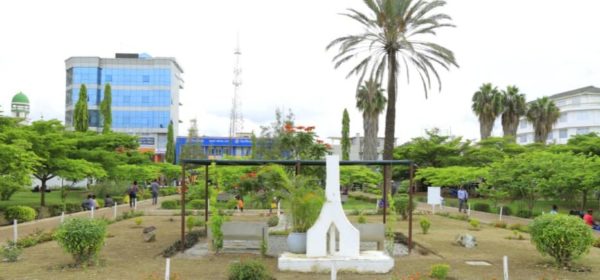Greening in a drought-prone city: An urban oasis in Dodoma flourishes
When the capital of Tanzania created an urban park in its center, the goal wasn’t only to make the headlines. Through clever use of water, the Nyerere Square garden continues to bring nature’s benefits to the city while providing a few unexpected delights.

Nyerere Square in Dodoma, the capital of Tanzania, used to be an open, concrete space with the statue of Julius Kambarage Nyerere the only attraction apart from the informal traders scattered along the main walkway. Nyerere is the former prime minister and president of Tanganyika, as Tanzania was known before, and subsequently president of Tanzania.
In 2019, the city partnered with the INTERACT-Bio project to create a green space in the square so residents can enjoy a reprieve from the busy streets while reaping the rewards of investing in urban nature. Plants were specifically chosen to not only green the city, but also attract pollinators and provide food.
It would prove challenging to sustain such an initiative, as Dodoma is notoriously prone to droughts. The city needed a way to sustain water supply so the park would be a permanent fixture and the food, shade and bees would continue to enrich the lives of its residents.

Engineers installed a grey water system that would irrigate the new garden while repurposing water that would normally be discarded. Plants do not require water filtered to standards of human consumption, so as long as the city produces grey water, the water supply continues.
Quite unexpectedly, Nyerere Square has also become a popular place for photo shoots. When you visit today, you’re likely to see couples posing beside the flowers or on the grass. At noon you’ll also see residents gathering at the tables and chairs under the trees, tucking into take away from food stalls.
Especially in Africa, where cities are growing at rapid rates and where many are predicted to see increasing droughts in the future, grey water systems are an excellent solution to conserve fresh, drinking water while providing cities with the chance to enjoy the benefits of urban nature. Gardens such as the one at Nyerere Square contribute to food security while reducing the urban heat island effect and the intensity of heat waves, which are predicted to become more intense as African cities continue to experience the impacts of climate change.
—
The INTERACT-Bio project is supported by the German Federal Ministry for the Environment, Nature Conservation and Nuclear Safety (BMU) through the International Climate Initiative (IKI).



